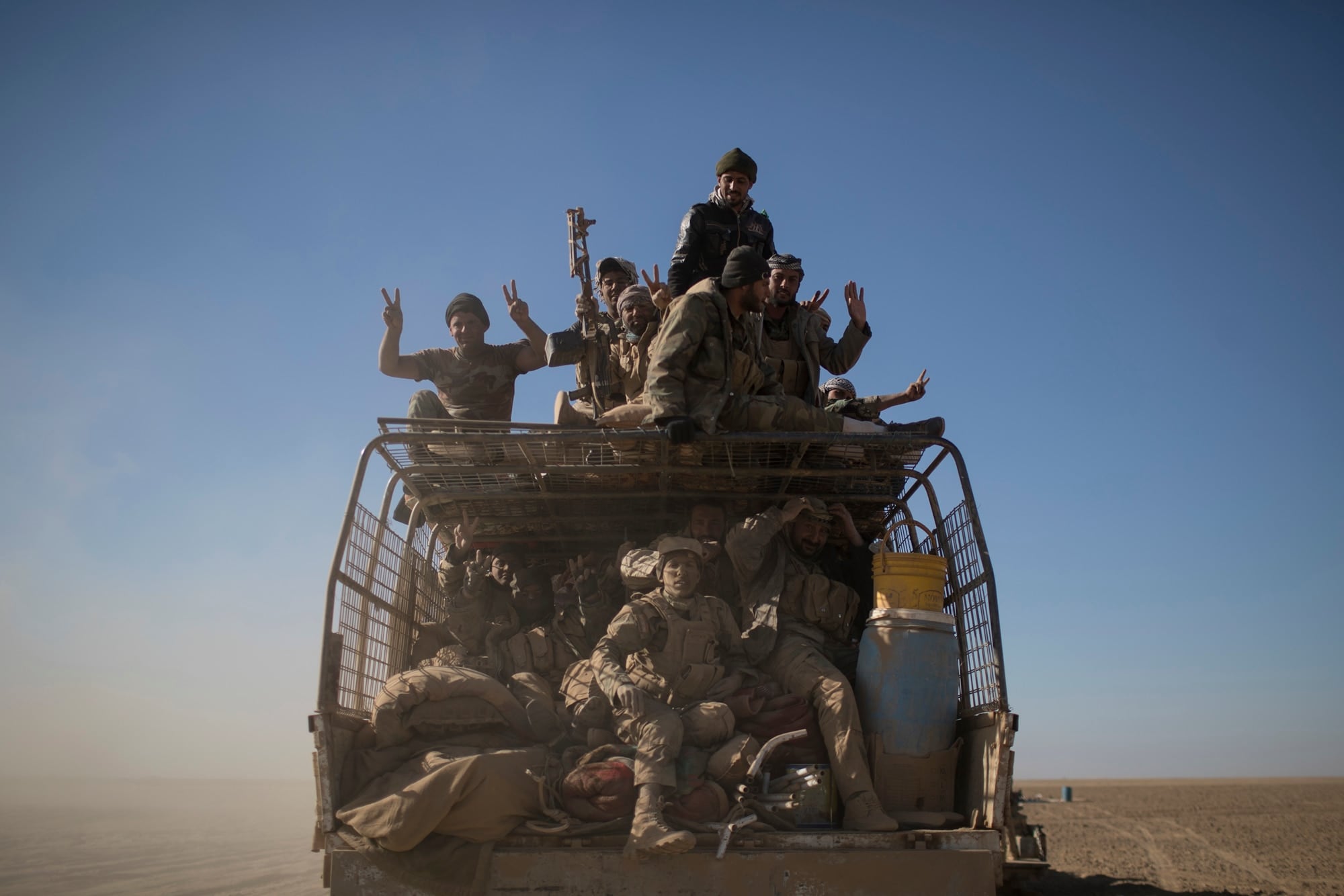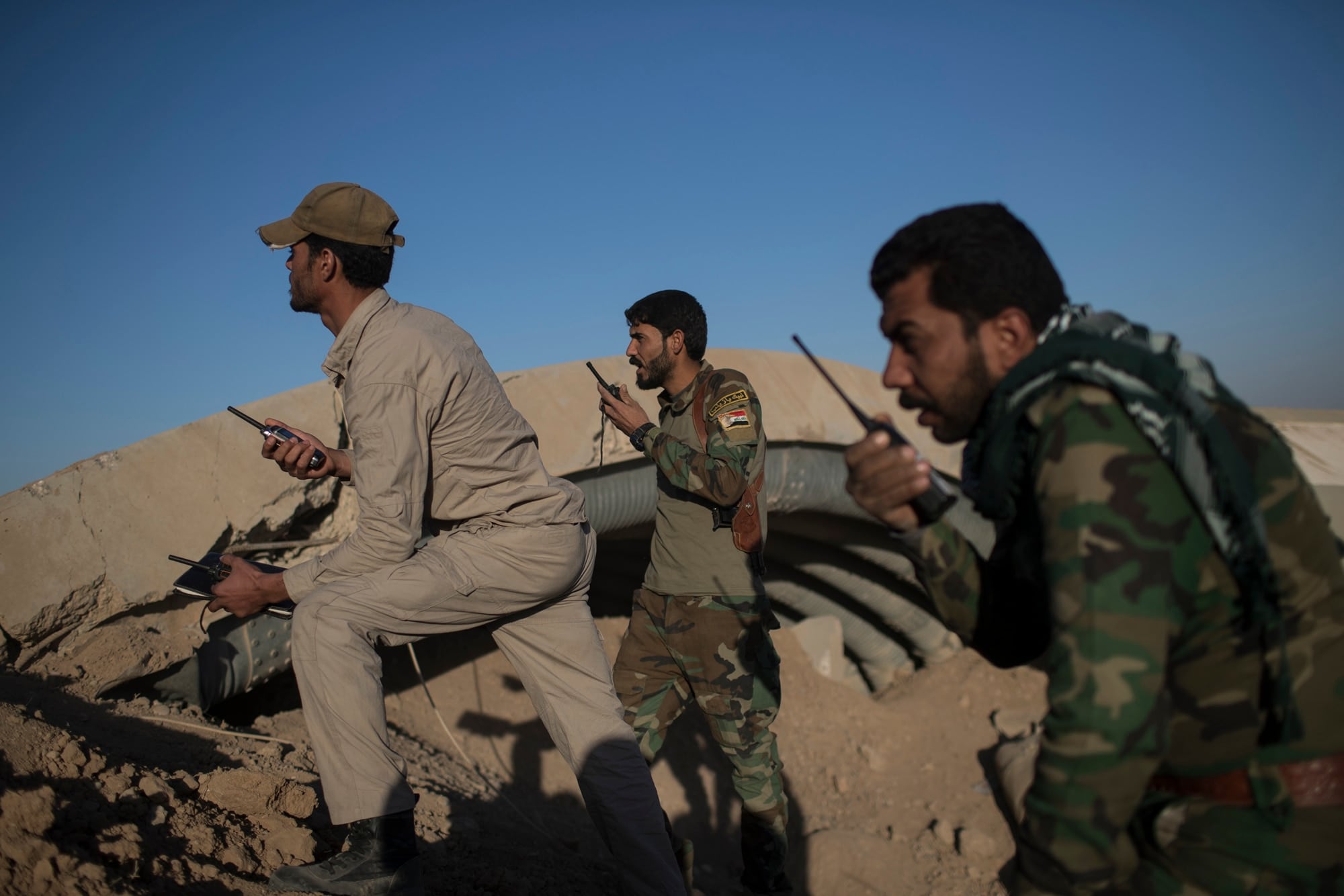TAL AFAR AIRPORT, Iraq — A sandstorm is brewing west of the Iraqi city of Mosul, kicked up across a barren landscape by thousands of men and machines headed to war.
Trucks, armored transports and even tanks carry fighters through a cloud of fine dust past a series of base camps and heavy weapons depots dotting the route to the front line against the so-called Islamic State.
These are the Shiite militias, and their goal is Tal Afar, on the main road to the Syrian city of Raqqa, the capital of IS' self-declared caliphate.
Currently a sideshow compared with the street-to-street fighting in Mosul, some 70 kilometers (44 miles) to the east, the battle for Tal Afar is certain to boost Shiite power. And its significance could be just as great — if not greater — for Iraq and the future of the region than the main battle for Mosul itself.
Officially, the Iraqi government and top militia leadership say that only Iraqi army units will enter Tal Afar, once dominated by Shiites but now primarily Sunni Turkmen, a minority in the country with cultural and historic links to nearby Turkey to the north.
But some of the militias' most powerful units, as well as field commanders and troops — all backed by a newly empowered Iran — tell a different story.
Jaafar al-Husseini, spokesman for Iraq's Hezbollah Brigades, said it is the militias backed by Shiite-heavy army units and Iranian weapons that will lead the charge into Tal Afar to drive out IS extremists.
"The Iranians are with us," he said, adding that Tehran was supporting the militias directly, including strategy from Revolutionary Guards commander Gen. Qassem Soleimani, who is in charge of a crescent of Shiite power stretching from Tehran to Beirut.
"Our mission and that of the (Iraqi Shiite) Badr Brigades is to encircle Tal Afar from the east. Then we will storm it," he said, adding that Soleimani visited a nearby staging ground three days ago.

Popular Mobilization Units fighters ride on the back of a truck on their way to fight against Islamic State militants in the airport of Tal Afar, west of Mosul, Iraq, Sunday, Nov. 20, 2016.
Photo Credit: Felipe Dana/AP
Iraq's Shiite militias mobilized against IS in 2014. Since then, they have shown a growing determination to be a major force shaping the country.
The prospect worries Iraq's Sunni minority but also some officials in the military and the Shiite-led government, who fear the militias, bolstered by prestige from battles with IS, could one day dominate the country like the Revolutionary Guard does in Iran and the guerrilla group Hezbollah does in Lebanon.
The larger militias, like Asaib Ahl al-Haq, the Hezbollah Brigades, Badr and the Peace Brigades, emerged after the 2003 ouster of Saddam Hussein, and are linked to political parties. But their ranks surged after IS overran nearly a third of Iraq in 2014, and Grand Ayatollah Ali al-Sistani, Iraq's top Shiite cleric, called on able-bodied males to fight the militant group's Sunni extremists.
Thousands rallied to the militias late last month, bringing their strength to at least 15,000 men in the push toward Tal Afar to cut off IS supply lines west of Mosul. Their umbrella group, Hashd al-Shaabi, has agreed not to enter Mosul itself, but the same cannot be said of all groups when it comes to Tal Afar.
On the winding route through the desert, a relentless flow of pickup trucks and Humvees carried men bristling with weapons. The Iraqi flag was a rare sight; instead, most carried banners from various Shiite militias, with their distinctive font and iconography similar to that of Iran's Revolutionary Guard and Lebanon's Hezbollah.
The deployment has not gone unnoticed in the region.

Popular Mobilization Units fighters talk on the radio as they watch Islamic State positions in the airport of Tal Afar, west of Mosul, Iraq, Sunday, Nov. 20, 2016.
Photo Credit: Felipe Dana/AP
Turkish President Recep Tayyip Erdogan warned that the militias could prompt a Turkish response if they "terrorize" the area's Iraqi-Turkmen. Ankara has deployed tanks and other vehicles to Silopi, a Turkish town on Iraq's northern border.
"In this respect, mistakes in Tal Afar could re-ignite a Sunni-Shiite civil war, or at the very least create obstacles to liberating Mosul," said Ayham Kamel, Director of Middle East and North Africa at Eurasia Group, a global political risk consultancy.
Iraqi Prime Minister Haider al-Abadi's official plan to have only the army enter Tal Afar played down the chance of an escalation, although the militias' actions may not.
Rights groups have accused the militias of abuses against civilians in other Sunni areas retaken from IS — allegations the militia leaders deny. Residents of Fallujah said Shiite groups exacted revenge during operations to retake the Sunni city last summer, alleging Sunni Arab civilians who fled IS-held areas were detained, tortured and killed.
Erdogan's ire probably was directed more toward Iran. The two countries' rivalry extends to northern Syria, where Iranian-backed militias fighting alongside Syrian forces are competing with Turkish-backed opposition forces for supremacy around the northern city of Aleppo.
Turkey launched Operation Euphrates Shield in August, partly to drive back Islamic State militants from its borders. But the rebels it backed have advanced south, raising alarm among hundreds of Shiite militiamen from Iran, Iraq and Lebanon trying to seize opposition-held eastern Aleppo.
Outside Tal Afar, the commander who led the operation to retake its airport last week said forces in the area would not stand for any Turkish intervention.
"We are Iraqis, and this is our country, and we consider any foreign intervention to be a provocation for us and our national sentiment," said Abu Taha Naser, "and God willing, this will not happen if the Turkish leadership is wise."
Should the militias take the city, it would cut a main IS artery into Syria, where the militants already face a recent offensive by a Syrian Kurdish-led force. That would be another major blow for the retreating militants and a boost for Syrian President Bashar Assad, an ally of Iran. Tal Afar would then be the last of a string of Shiite cities and towns stretching from Iran across Iraq toward the Syrian border.
No matter who leads the offensive into Tal Afar, the Shiite forces will inevitably hold the city because they — and not the Iraqi army — are in the area by the thousands, said Dana Jalal, a Kurdish specialist on Iraqi militias.
"Yes, they will enter Tal Afar, along with the Iraqi army's 92nd brigade," he said. "It's actually more the will of the Iraqi army and less that of the government."
Iraqi officials still deny that the military will play a secondary role to the militias or leave it in their hands once Tal Afar is taken. But a look at the army unit intended to join the militias in the days ahead raises further doubt that Iraq's central government will be the main force in the fight for the city.
The 92nd brigade, nicknamed the "Tal Afar Brigade," is made up almost entirely of Shiites from the city. But it also goes by another label: the "Hussein Brigade" — named for the revered Imam Hussein, the Prophet Muhammad's grandson and a key figure in Shiite Islam.
Flags featuring the Iman Hussein were a common sight on vehicles racing through the desert, with militiamen exclaiming, "On to Tal Afar!" At a provisions depot farther behind the front line, militiamen ate sandwiches while listening to hymns chanting the imam's name.
With the thud of incoming mortar rounds from IS positions and ricochets from sniper fire as a backdrop, militiaman Taha Naser was clear.
"The priority is to cut the supply route between Tal Afar and Raqqa," he said, "and then to liberate the city of Tal Afar."
Associated Press writer Qassim Abdul-Zahra contributed from Erbil.



